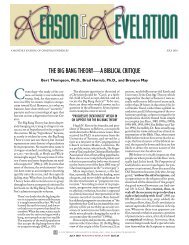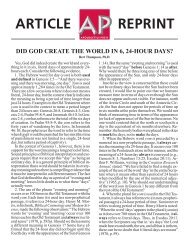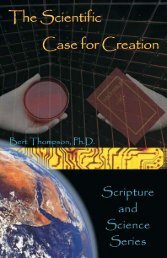The Many Faces, and Causes, of Unbelief - Apologetics Press
The Many Faces, and Causes, of Unbelief - Apologetics Press
The Many Faces, and Causes, of Unbelief - Apologetics Press
Create successful ePaper yourself
Turn your PDF publications into a flip-book with our unique Google optimized e-Paper software.
Just because “hundreds <strong>of</strong> thous<strong>and</strong>s <strong>of</strong> scientists” believe<br />
something does not make it right. As Darrell Huff observed:<br />
“People can be wrong in the mass, just as they can individually”<br />
(1959, p. 122). If something is true, stating it a million<br />
times does not make it any truer. Similarly, if something is<br />
false, stating it a million times does not make it true.<br />
Second, the prestige <strong>of</strong> a position’s advocates has nothing<br />
to do with whether that position is true or false. Newspaper<br />
magnate William R<strong>and</strong>olph Hurst Jr. once wrote about pressures<br />
from “fashionable ideas...which are advanced with such<br />
force that common sense itself becomes the victim.” He observed<br />
that a person under such pressure then may act “with<br />
an irrationality which is almost beyond belief” (1971, p. A-4).<br />
As pro<strong>of</strong> <strong>of</strong> his point, consider the suggestion some years<br />
ago by renowned scientist (<strong>and</strong> Nobel laureate) W.B. Shockley<br />
that highly intelligent women be artificially inseminated using<br />
spermatozoa from a select group <strong>of</strong> Nobel Prize winners<br />
in order to produce what he felt would be quite obviously<br />
super-intelligent <strong>of</strong>fspring. <strong>The</strong>re can be no doubt whatsoever<br />
that Dr. Shockley happened to be “a giant in his field”<br />
with “rocket scientist” intelligence. If the intellect or prestige<br />
<strong>of</strong> a person is enough to guarantee the validity <strong>of</strong> the positions<br />
he(or she) espouses, then perhaps the human race should<br />
have taken Dr. Shockley up on his suggestion.<br />
But intellectual prowess or prestige does not confer veracity<br />
on a person’s position(s). Shockley’s idea, for example,<br />
was based on nothing more than the narcissism <strong>of</strong> an over-inflated<br />
ego. As Taylor has commented: “Status in the field <strong>of</strong><br />
science is no guarantee <strong>of</strong> the truth” (1984, p. 226). <strong>The</strong> soundness<br />
or strength <strong>of</strong> a claim is not based on: (a) the number <strong>of</strong><br />
people supporting the claim; or (b) the intellect or prestige <strong>of</strong><br />
the one(s) making that claim.<br />
Third, the idea <strong>of</strong> strict objectivity in intellectual circles is a<br />
myth. While most scholars like to think <strong>of</strong> themselves as broadminded,<br />
unprejudiced paragons <strong>of</strong> virtue, the fact is that they,<br />
too, on occasion, suffer from bouts <strong>of</strong> bias, bigotry, <strong>and</strong> presuppositionalism.<br />
Nobel laureate James Watson remarked<br />
-91

















